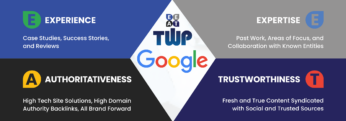SEO Effectiveness: WordPress vs. Drupal
For Product & Catalog Websites
WordPress
Ease of Use
Beginner-friendly UI with an intuitive dashboard and a huge number of pre-built SEO plugins like Yoast SEO and All in One SEO that make optimization accessible to everyone.
Implementation
Quick setup using themes and plugins, minimizing the need for extensive developer time. Ideal for fast market entry and rapid content updates.
Scalability
Works well for small to medium-sized catalogs. Requires careful management and additional optimization plugins to handle large-scale product data efficiently.
Customization
Extensive plugin ecosystem provides excellent functionality, but deep, highly specific SEO customization can be limited by the plugin’s capabilities.
Target User
Ideal for small to medium businesses, bloggers, and marketing teams that prioritize ease of use and a fast time-to-market.
Drupal
Ease of Use
Features a steeper learning curve and a more complex backend. Requires a solid understanding of its module system and technical configuration.
Implementation
Implementation often involves a development team to configure modules like Pathauto and Metatag. This can lead to higher upfront costs and a longer launch time.
Scalability
Built for large-scale, complex websites. Its robust architecture and performance modules are well-suited to handle thousands of product pages and high traffic volume.
Customization
Offers deep, fine-grained control over every technical SEO aspect. This allows for highly tailored strategies to meet complex and evolving business requirements.
Target User
Best for large enterprises, government agencies, and organizations with a dedicated development team and complex SEO requirements.
This For a product and catalog-based website with the same content, the effective results of SEO strategies with WordPress versus Drupal are highly dependent on the user’s technical expertise and the scale of the website. Both platforms are capable of achieving excellent SEO results, but they approach the task from different philosophical standpoints with Drupal requiring significantly more technical manpower.1
WordPress: The User-Friendly Approach
WordPress is known for its ease of use and a vast ecosystem of plugins.2 This makes it an ideal choice for users who may not have deep technical knowledge of SEO.
Effective Results & How They Are Achieved:
- Quick & Easy On-Page SEO: Plugins like Yoast SEO and All in One SEO (AIOSEO) provide user-friendly interfaces with a “traffic light” system or a checklist to guide content creators.3 They make it simple to optimize key on-page elements, such as:
- → Meta Titles & Descriptions: The plugins allow for easy editing and provide character/pixel count suggestions.
- → Focus Keywords: They analyze content to ensure it is optimized for a specific keyword.
- → Readability: They offer suggestions to improve content structure and readability, which indirectly helps with user experience and engagement.
- → Image Optimization: Plugins can help with adding alt tags and compressing images for faster load times.4
- Rich Snippets & Schema Markup: SEO plugins for WordPress often have built-in features for adding schema markup (e.g., product schema, review schema).5 This is crucial for product pages as it allows them to appear as “rich snippets” in search results with star ratings, pricing, and availability, which can significantly increase click-through rates.6
- Fast Implementation of Core SEO: Setting up a sitemap, managing 301 redirects, and creating SEO-friendly URL structures (permalinks) are made simple with plugins.7 For a catalog site, having clean URLs like /product-name is vital for both search engines and users.8
- E-commerce Integration: WordPress’s integration with WooCommerce is seamless, and there are specialized SEO add-ons for WooCommerce that help with product SEO, from image optimization to individual product page optimizations.9
Key takeaway: WordPress’s strength lies in making SEO accessible and manageable for non-developers. The effective results come from a quicker, more streamlined process, which is especially beneficial for small to medium-sized businesses and websites where a marketing team, rather than a development team, handles content.
Drupal: The Developer-Centric Approach
Drupal is a more robust and flexible framework, often favored for large-scale, complex websites.10 Its SEO capabilities are powerful but require more technical expertise to configure.
Effective Results & How They Are Achieved:
- Fine-Grained Control & Advanced Customization: Drupal’s modular architecture allows for precise control over every aspect of a site’s SEO. Modules like Pathauto for automated URL aliases and Metatag for managing metadata offer deep configurability. This level of control is excellent for complex product catalogs with many categories, subcategories, and filters. You can create highly specific URL patterns and metadata rules.
- Scalability & Performance: For a large product catalog with thousands of items, Drupal’s performance-focused architecture can lead to faster page load times. Speed is a crucial ranking factor for search engines.11 Drupal is generally faster “out-of-the-box” than WordPress in its purest form, and its caching and performance optimization tools are designed for high-traffic sites.12
- Structured Data & Content Relationships: Drupal excels at handling complex data relationships.13 This is a significant advantage for a product catalog. It can be used to create sophisticated structured data (JSON-LD) that helps search engines understand the relationships between different product variants, categories, and reviews.
- Multilingual SEO: For a global product catalog, Drupal has superior built-in support for multilingual content.14 The Hreflang module, for example, helps search engines understand language and regional variations, preventing duplicate content issues and ensuring the correct version of a page is served to the user.15
Key takeaway: Drupal’s effective results are a product of a more powerful, customized, and scalable technical foundation. For massive or highly complex product and catalog websites, the initial investment in a development team to configure Drupal’s SEO modules can lead to a more efficient and high-performing site in the long run.
Comparison Summary
| Feature | WordPress | Drupal |
| Ease of Use | High. Plugins provide user-friendly interfaces for quick optimization. | Moderate to Low. Requires more technical knowledge to configure modules. |
| SEO Implementation | Fast. “Out-of-the-box” solutions with plugins like Yoast SEO and AIOSEO. | Slower. Requires a developer to configure modules for specific needs. |
| E-commerce | Excellent. Seamless integration with WooCommerce and specialized SEO add-ons. | Good. Can be integrated with e-commerce platforms like Shopify, or via custom solutions. |
| Scalability | Good. Can be scaled, but may require additional performance plugins and careful management for very large catalogs. | Excellent. Built to handle large, complex, and high-traffic websites. |
| Customization | Good. Plugins offer many features, but advanced customization can be limited by the plugin’s scope. | Excellent. Modules allow for deep, fine-grained control and custom configurations. |
| Security | Good. Security depends heavily on the quality of themes and plugins used, and proper maintenance. | Excellent. Known for its superior security architecture, making it a common choice for government and enterprise sites. |
| Target User | Marketers, small businesses, and content creators. | Developers, enterprises, and organizations with complex needs. |
Conclusion:
For a product and catalog website, both WordPress and Drupal can yield powerful SEO results.16 However, their paths to success are different.
- Choose WordPress if you prioritize a faster, more accessible, and user-friendly approach. The effective results will come from a marketing team’s ability to quickly implement and manage SEO strategies with the help of intuitive plugins. The trade-off is that for a very large, enterprise-level catalog, performance and a higher level of custom control might become a challenge.
- Choose Drupal if your website is a large, complex catalog and you have the technical resources to leverage its powerful, flexible framework.17 The effective results will be a product of a highly tailored, scalable, and technically optimized site that can handle extensive product data and traffic. The trade-off is a higher initial cost and a steeper learning curve.
SOURCES
Acquia: “Drupal SEO: Best Modules, Optimization Tips & Advanced Strategies” – A detailed guide on Drupal’s built-in SEO features and how to leverage modules for a strong SEO foundation. https://www.acquia.com/blog/drupal-seo
Drupal Fan: “Drupal SEO: Best Modules, Checklist & Optimization Tips 2025” – This article highlights Drupal’s scalability, customization options, and specific modules that help with on-page SEO. https://drupfan.com/en/blog/drupal-seo-complete-2025-guide
O8 Agency: “Drupal SEO: The Ultimate Guide” – A guide that covers the basics of Drupal SEO, including the importance of content and data analysis. https://www.o8.agency/blog/drupal/drupal-seo-ultimate-guide
Network Solutions: “5 Benefits of WordPress for Building Your Website” – This source emphasizes WordPress’s ease of use, vast plugin ecosystem, and built-in SEO features. https://www.networksolutions.com/blog/benefits-of-wordpress/
Hostinger: “10 reasons you should choose WordPress for small business” – An article that outlines why WordPress is a great choice for small businesses due to its low cost, user-friendliness, and SEO capabilities. https://www.hostinger.com/tutorials/wordpress-for-small-business-growth
HostPapa: “Is WordPress Good for Small Business Websites?” – A source that talks about the benefits of WordPress for small businesses, including its open-source nature, vast community, and SEO-friendly features. https://www.hostpapa.com/blog/wordpress/is-wordpress-good-for-small-businesses/
Pantheon: “WordPress vs Drupal – Balancing Ease vs Customization” – This resource offers a balanced comparison of the two platforms, noting that both are strong for SEO but cater to different user needs. https://pantheon.io/wordpress-vs-drupal
Krystal Hosting: “Drupal vs WordPress SEO: Which CMS does it better?” – This article concludes that both platforms can achieve great SEO results, but the choice depends on your specific needs and technical skill set. https://krystal.io/blog/post/drupal-vs-wordpress-seo








